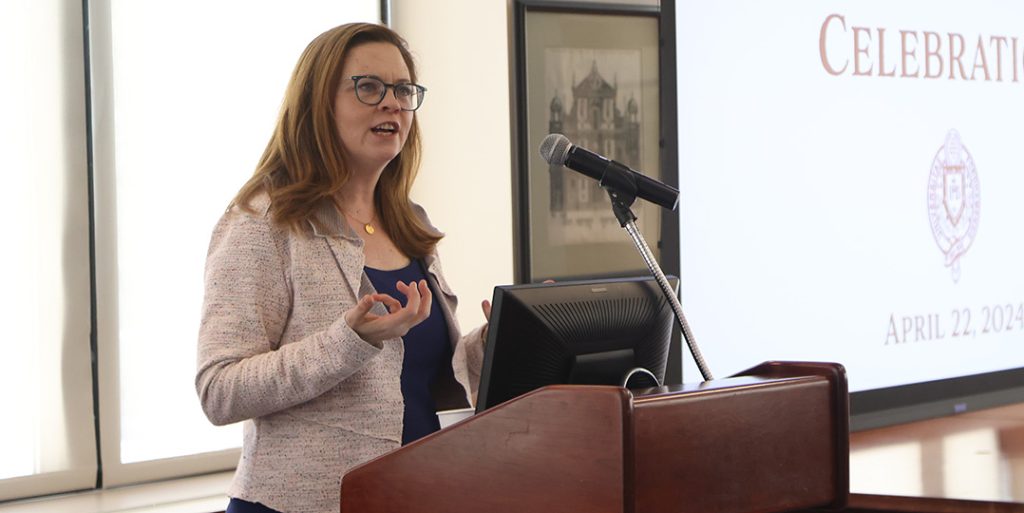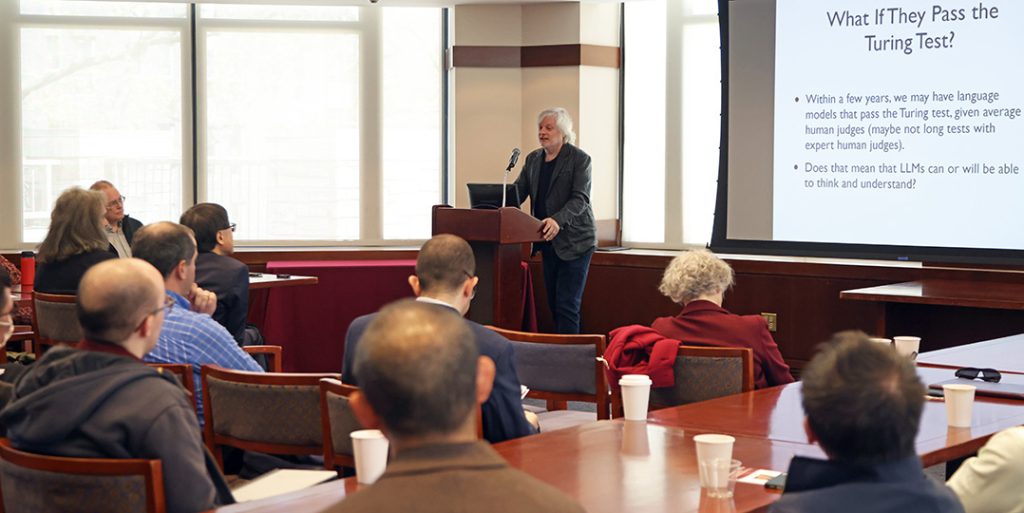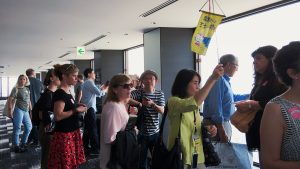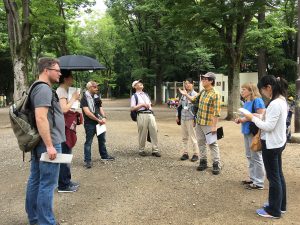Dozens of faculty, staff, and students gathered at the Walsh Family Library on the Rose Hill campus for the annual Research Day Celebration. In opening remarks, Fordham’s president, Tania Tetlow, invoked several current issues—threats to democracy, artificial intelligence, climate change—in emphasizing the importance of “every insight” that Fordham faculty produce.
“There is so much that you achieve, on behalf of Fordham and on behalf of the world,” she said. “You matter in everything that you do, and you matter even more when you come together across disciplinary silos, when you think about how we can solve problems in ways that will never come from any one discipline and never come from any one way of thinking about the world.”
Fordham’s chief research officer, George Hong, Ph.D., noted a “remarkable achievement” in his introductory remarks: Since the academic year began last July, Fordham has received $34 million in external grant awards, its greatest-ever yearly total and a 40% increase over the amount received by this time last year.
Awards for Distinguished Research
The professors each received a distinguished research award in one of five categories and gave brief remarks. The humanities award went to history professor Kirsten Swinth, Ph.D., for her studies of working families originally inspired by the “mommy wars” in 2004. “I couldn’t believe that it was the 21st century and people were still arguing passionately about whether mothers should be employed,” she said, adding later that she has strived “to illuminate and change the conversation about work and family among scholars and the wider public.”
Christopher Koenigsmann, Ph.D., associate professor of chemistry, received the sciences and mathematics award for his nanotechnology research that’s applicable to renewable energy, biomedical sensors, or technology that scrubs viruses out of indoor air. He credited the undergraduate students who helped with his research. “As they’re learning physical chemistry, they’re also solving problems—real problems—for society,” he said.

Jie Ren, Ph.D., associate professor of information systems in the Gabelli School of Business, received the interdisciplinary studies award for her work on collective online behavior and its impacts across business, social media, and other areas. “Throughout many years of studying this topic, I realized one thing, which is individuals in the crowd need each other to be better,” she said.
The Distinguished Research Award for Junior Faculty went to Mohamed Rahouti, Ph.D., assistant professor in the computer and information science department, for his cybersecurity innovations that draw upon blockchain technology and artificial intelligence. Receiving the award, he said, “inspires me to further my research with even greater dedication and passion.”
The social sciences award went to economics professor Marc Conte, Ph.D., for his work in environmental economics and environmental justice, some of which was cited in the Biden administration’s Economic Report of the President in 2023. “I look forward to continuing my work … in the hope of guiding us toward a more stable and equitable world,” he said.
Can ChatGPT Think?
The event also included presentations by Fordham’s IBM research fellows and interns, and by participants in the University’s Faculty Research Abroad Program. The keynote speaker was David Chalmers, professor of philosophy at New York University, who gave a talk titled “Can ChatGPT Think?”
“It probably doesn’t yet have humanlike thought,” he said toward the end of his talk, “but I think it’s also well on its way.”

The consortium is inviting faculty to become affiliated members.
“What we really want to do is incorporate a lot of the work that our faculty and staff are doing all over the world, and channel them through the consortium,” said O. Hugo Benavides, Ph.D., consortium director and chair of the sociology and anthropology department.
Collaborating to Avoid ‘Double Efforts’
Benavides formed the consortium last fall along with two co-directors: Aseel Sawalha, Ph.D., associate professor of anthropology, and Matthew Chin, Ph.D., assistant professor in the Graduate School of Social Service. GSC’s goal is to promote and integrate existing global research initiatives across the University’s different schools, departments, and programs—especially projects that are very similar.
“That’s one of the things we’re really interested in, so that people don’t do double efforts and reinvent the wheel,” said Benavides. “[With the consortium] they can reach out very easily to other colleagues that are doing similar work.”
To better understand the needs of his colleagues, Benavides and his colleagues hosted a forum this past November at the Lincoln Center campus. About 20 faculty members from at least four different schools sat at a table and shared their research objectives. A similar forum will be held next spring. Over the next couple of months, GSC will also create a consortium listserv and website.
“Our hope is to get people talking to each other so that they could do more collaborative research projects and apply for external grants,” Benavides said.
Research Abroad
The group is also planning for some travel. It will be co-sponsoring the third Fordham University Faculty Research Abroad Program (FRAP), designed to facilitate research collaboration between Fordham and foreign scholars, next summer in Rio de Janeiro, Brazil.
“Members who are affiliated to us have access to form different collaborations with other universities and colleagues at other universities,” Benavides said.
At the heart of the consortium is research that has an impact on local communities, said Benavides.
“We want to get involved with activists and artists and local communities and the kind of issues that are important and relevant to us today,” Benavides explained. “And particularly to use the strengths that our faculty have.”
Anyone interested in becoming a GSC affiliated faculty member should contact Benavides, Sawalha, or Chin at [email protected], [email protected], or [email protected].
]]>The International Symposium on Digital Scholarship took place from June 3 to 5 at Birkbeck College and Fordham’s London Centre. Sponsored by the University’s Office of Research, it featured a mix of lectures, workshops, and formal and informal gatherings geared toward furthering research opportunities and international collaborations.
If last year’s gathering illustrated how cross-border collaboration is key to tackling vexing challenges of our time, the London gathering showed how, in the digital realm, no one discipline can go it alone.
Bringing Technology and Scholarship Together
“Digital scholarship is notable for its interdisciplinary nature, since it involves not only IT and computer science, but also the humanities, social sciences, and schools of education,” said Maryanne Kowaleski, Ph.D., the academic coordinator for the digital symposium.
The Joseph Fitzpatrick S.J. Distinguished Professor of History and Medieval Studies and curator of Fordham’s Medieval Sources Bibliography, Kowaleski has deep connections to both London and the digital humanities.
In London, she delivered a keynote address, “Giving Credit Where Credit is Due: Acknowledging Collaborative Work in Digital Scholarship Projects.” She also presented a research project that touches on both London and the digital realm, titled “Prosopography, Database Design, and Linked Data in the Medieval Londoners Project.”
The project is a collaboration with Katherina Fostano, visual resources coordinator in the department of Art History, and Kowaleski said it was notable that Fostano presented at the conference, as did Elizabeth Cornell, Ph.D., director of communications at Fordham’s department of information technology. Adding professional staff such as librarians and graduate students to the mix, was key to the conference’s success, she said.
“One of the things that my research shows, and that I have experienced, is how crucial librarians are to digital efforts now. I’m grateful that Fordham has included them in this program,” she said.
London and New York, Working as a Team
Representing the Graduate School of Education (GSE), Professor of Childhood Special Education Su-Je Cho, Ph.D, and doctoral student Kathleen Doyle jointly presented “Using a Digital Learning Platform to Increase Levels of Evidence-Based Practices in Global Teacher Education Programs.” It detailed Project REACH, a U.S. Department of Education-funded initiative that makes widely available the best evidence-based practices for training prospective teachers.
George Magoulas, Ph.D., Alex Poulovassilis, Ph.D., and Andrea Cali, Ph.D., members of Birkbeck College’s Knowledge Lab, helped them collect and analyze data through the website.
Working with a partner in London made sense for this project, Cho said, because one of her goals is for Project REACH to get more use internationally. She, Doyle, and the GSE’s Alesia Moldavan, Ph.D., assistant professor of mathematics education, will collaborate with Christine Edwards-Leis, Ph.D., associate dean of research, and enterprise and doctoral student Jennifer Murray from St. Mary’s College in London on a new endeavor geared toward student teachers’ mental health. Once finished, it will be incorporated into Project REACH.
“The student teaching experience is very stressful, because it’s not their own classroom they have to student teach in. It’s someone else’s classroom. By providing this kind of platform, they can also share their concerns and knowledge and frustrations with the students overseas,” she said.
For Doyle, the trip was an opportunity to see how colleagues from other disciplines assemble collaborative teams.
“I really appreciated learning across the fields. Being in the Graduate School of Education, I’ve been mainly focused on that field. It was refreshing to hear about the other ways digital scholarship is utilized in other disciplines,” she said.
Urban Challenges That Cross Borders
Gregory T. Donovan, Ph.D., assistant professor of communication and media studies, presented “Keeping Place in ‘Smart’ Cities: Situating the Settlement House as a Means of Knowing and Belonging in the Informational City.” The project, which he is developing with the assistance of Melissa Butcher, Ph.D., reader in social and cultural geography at Birkbeck College, will highlight the efforts of New York City’s Lincoln Square Neighborhood Center and London’s Toynbee Hall.
The project will focus on the “settlement house” model of community center that was founded a century ago to confront segregation and displacement and promote belonging.
“New York City and London are examples of global cities that are going through significant technological change, both in terms of the cities themselves becoming more digitized as well as the economy and the kinds of jobs and the kinds of education that’s being elevated. With that comes all kinds of difficult changes and gentrification that causes displacement,” said Donovan, who is also organizing November symposium at Fordham called Mapping (in)justice.
“We’re going to look at how we might network [Lincoln Square and Toynbee] through digital technology and think about how they’re managing to keep pace in these communities that are often being displaced in this kind of digital gentrification.”
]]>This past May, Fordham took a big step toward embracing this new world, as 14 members of the faculty and administration traveled to Sophia University in Japan as part of the first Fordham Faculty Research Abroad program.
The delegation, which was led by Fordham’s provost, the late Stephen M. Freedman, Ph.D., hailed from fields as varied as political science, economics, biological sciences, education, social service, and art history. The theme of the trip was comparative urban studies.
George Hong, Ph.D., chief research officer and associate vice president for academic affairs, said the trip was the result of Fordham’s Continuous University Strategic Planning (CUSP) process, which the University began in 2015.
In the CUSP process, four areas were given high priority: Interdisciplinary research, sponsored research, global research, and faculty-student research collaborations. This trip fulfilled all of those priorities by bringing Fordham researchers into contact with peers in Japan who are pursuing research on many topics within that field. It also established an exchange program for faculty and students between the two schools.
Collaborating on Food Justice

One of those connections was between Garrett Broad, Ph.D., assistant professor of Communication and Media Studies and James Farrer, Ph.D., a professor of sociology and global studies at Sophia University. Farrer has been researching food entrepreneurship in Tokyo and the role that small vendors play in local economies, a topic of interest to Broad, who penned More Than Just Food: Food Justice and Community Change (University of California Press, 2016).
“We’re talking about setting up a workshop here in New York at some point next year where we bring together a group of scholars who are exploring issues related to food, society, globalization and local food economies,” Broad said.
“The hope for this enterprise is it’s not a one off, where we had this nice trip to Tokyo, made some friends and that’s that. We want to continue and build some partnerships, and since there’s only so much you can do in just a few days, a workshop is a way we can keep the momentum going.”
Broad also took the opportunity to visit and interview scientists at a Tokyo organization that is experimenting with “cellular agriculture.” The technology, which Broad had already been researching for an upcoming project, involves growing meat in a laboratory, negating the need to slaughter animals. To help him overcome language and cultural barriers, he recruited Sophia University undergraduate students to accompany him.
Making Personal Connections in the Field

Annika Hinze, Ph.D., assistant professor of political science and director of Fordham’s urban studies program, came away from the trip deeply affected by potential collaborations. While one group from Fordham was given a tour related to sustainability and environmental issues, she attended a tour centered on social issues that was led by Nanako Inaba, a professor in Sophia’s department of global studies.
Of particular interest to Hinze was a public park that had recently been partially sold to private interests, including Nike. A sizable homeless population still calls the park home, and Hinze interviewed one of them to get a sense of how his presence was actually a form of protest.
“I’m a field researcher first and foremost, and in order to understand places, it’s vital to actually visit them and get to know them a little bit. The initial connections you make with people can be the jumping point for creating meaningful research partnerships,” she said.
“The walking tours were amazing, because they were done by people who are academics who are researching social or sustainability issues and who really know the environment.”
Global Partnerships Critical to Funded Research
Connections such as these are crucial to solving challenges, Hong said. They’re also often a prerequisite for researchers who wants to get their projects funded by some external sources.
“More and more American foundations are requiring global partnership as precondition for applications. If you don’t have an international partner, you are out,” he said.
On that front, the trip was also a success, as Fordham faculty identified 27 researchers in Japan who are ready to collaborate on joint grant proposals, research projects, and research papers. Hong and his team also identified more than 40 funding opportunities to support these research projects. Several faculty members are working on joint proposals, he said, and one has already submitted one. He expects that there will be opportunities for Fordham students to assist in future studies as well.
Hong noted that a byproduct of Fordham faculty traveling together was also an increase in collaborations amongst themselves. Next summer, a group of them will travel to Europe, where the theme will be “digital scholarship.”
“They immediately picked up some ideas and learned from each other. It was the same subject, urban studies, but different disciplines, education, social service, the sciences, history, social sciences, humanities, natural science,” he said.
In addition to prearranged meetings, there were serendipitous meetings at Sophia University as well. Takehiro Watanabe, Ph.D., an associate professor of anthropology at Sophia whose research touches on participatory community environmental processes, led the Fordham contingent on a tour of a river revitalization project and chaired a panel discussion that Broad participated in.
“Afterward, he saw some things in my presentation that connected to some of the subjects that he’s interested in, such as participatory science and citizen science,” Broad said.
“The more time you’re able to spend, and the more people you’re able to meet, you realize you have more in common.”
]]>